
Acanthocalycium is a genus of cactus consisting of several species from Argentina, Bolivia, Brazil, Paraguay and Uruguay. The taxon name comes from Greek akantha and kalyx, which refers to the spines on the floral tubes.

Reicheocactus is a monotypic genus of cactus in the family Cactaceae, native to north western Argentina. It has only one known species, Reicheocactus famatimensis.
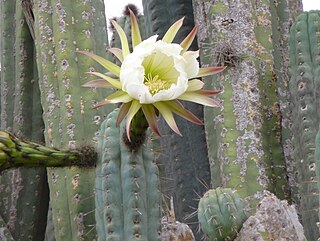
Echinopsis lageniformis, synonyms including Echinopsis scopulicola and Trichocereus bridgesii, is a cactus native to Bolivia. It is known as the Bolivian torch cactus. Among the indigenous populations of Bolivia, it is sometimes called achuma or wachuma, although these names are also applied to related species such as Trichocereus macrogonus which are also used for their psychedelic effects.

Chamaecereus silvestrii is a species of cactus from northwestern Argentina and Bolivia. Synonyms include Echinopsis chamaecereus and Lobivia silvestrii. It has been called the peanut cactus. This plant should not be confused with Echinopsis silvestrii, a synonym of Echinopsis albispinosa, a species with a very different appearance.

Soehrensia candicans is a species of cactus from northern and western Argentina. It has large fragrant white flowers that open at night.

Gymnocalycium baldianum, the spider-cactus or dwarf chin cactus, is a species of flowering plant in the cactus family Cactaceae, native to the Catamarca Province in Argentina.

Acanthocalycium thionanthum is a species of Acanthocalycium from Argentina.

Oreocereus trollii, commonly known as the Old Man of the Andes cactus, is a species of cacti native to Argentina and Bolivia. Though listed as Least Concern by the IUCN, the plant is collected extensively, and in some areas is threatened.

Lobivia ancistrophora is a species of cactus. It has a globular shape, few spines, with large, white flowers attached to long, green tubes. It occurs in Bolivia, at altitudes of 600–1800 metres. Under its synonym Echinopsis ancistrophora it has gained the Royal Horticultural Society's Award of Garden Merit.

Soehrensia formosa, is a species of Echinopsis found in South America. In north-western Argentina, Bolivia and northern Chile. First published in Cactac.: Handb. Kakteenk. 3: 1678 in 1959.

Echinopsis densispina, is a species of Echinopsis cactus found in Argentina.

Echinopsis aurea, is a species of Echinopsis cactus found in Argentina.
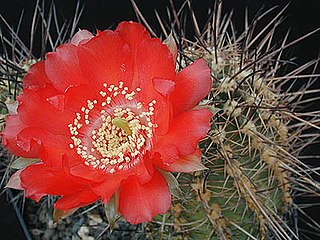
Echinopsis haematantha, is a species of Echinopsis found in Argentina and Bolivia.

Soehrensia huascha, is a species of Soehrensia in the Cactaceae family, found in north western Argentina. First published in Cactaceae Syst. Init. 29: 5 in 2013.

Echinopsis tacaquirensis, is a species of Echinopsis cactus found in Bolivia.
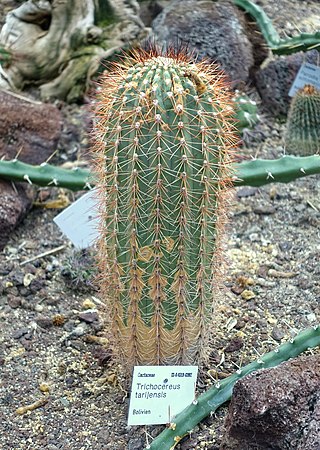
Soehrensia tarijensis, is a species of Soehrensia, in the cactus family. It is native to Bolivia and northwestern Argentina.

Echinopsis chrysantha, is a species of Echinopsis cactus found in Argentina.
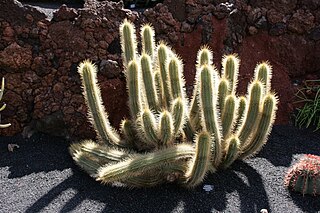
Soehrensia thelegonoides is a species of Soehrensia found in Argentina.
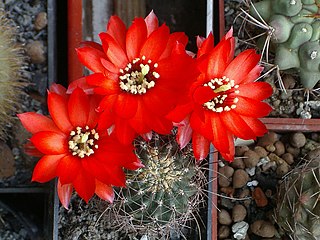
Chamaecereus saltensis is a species of cactus from northwestern Argentina.

Gymnocalycium castellanosii is a species of Gymnocalycium from Argentina.





















